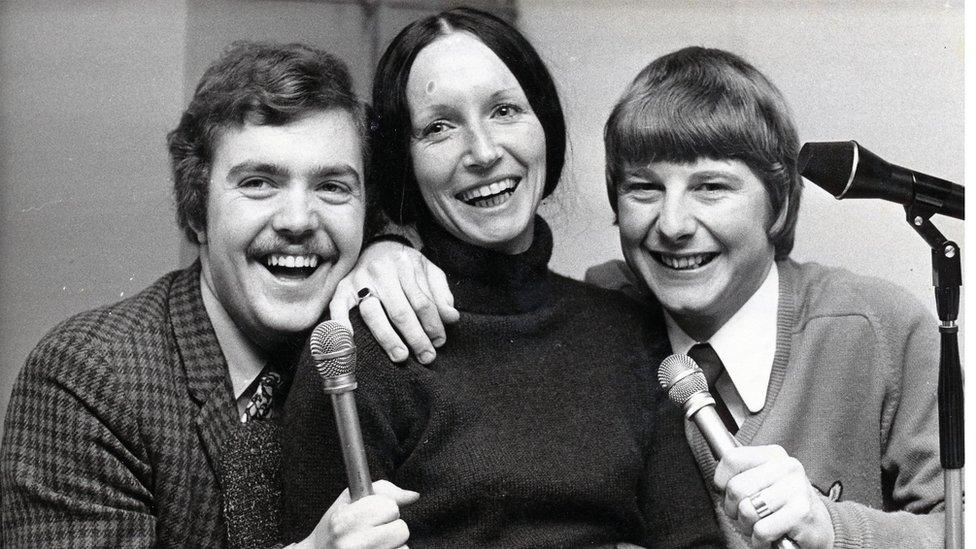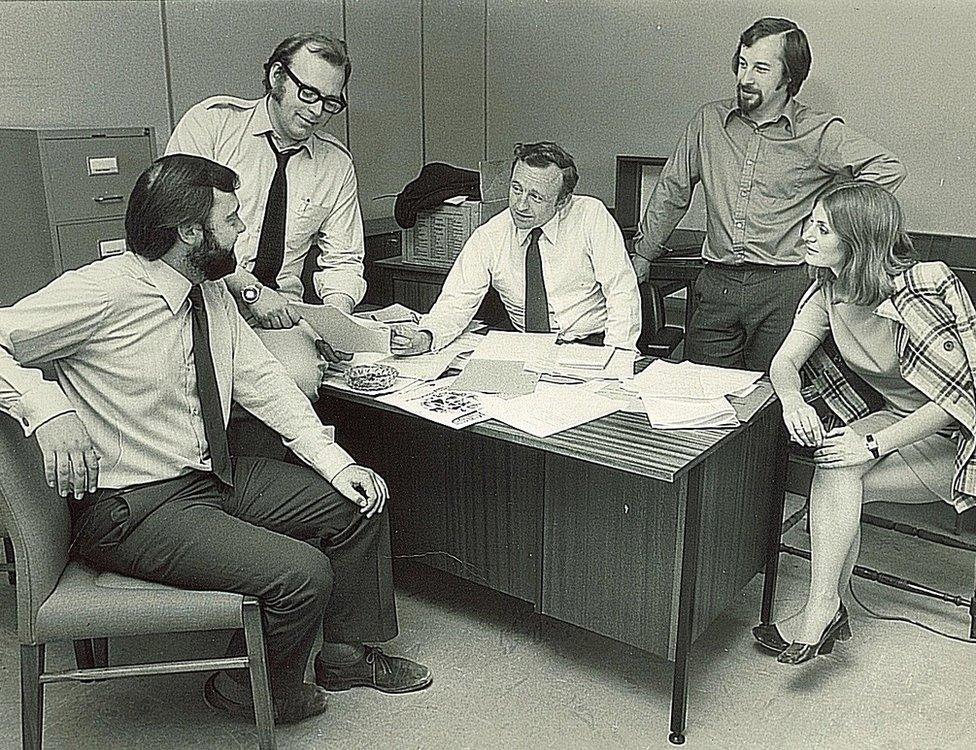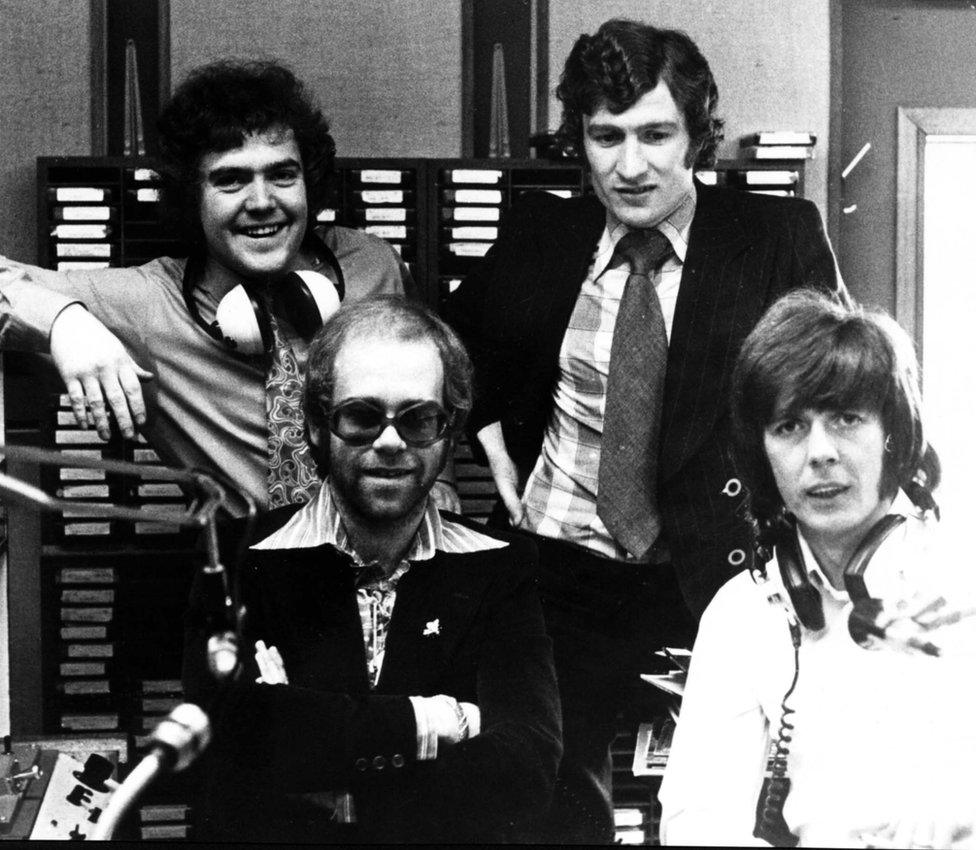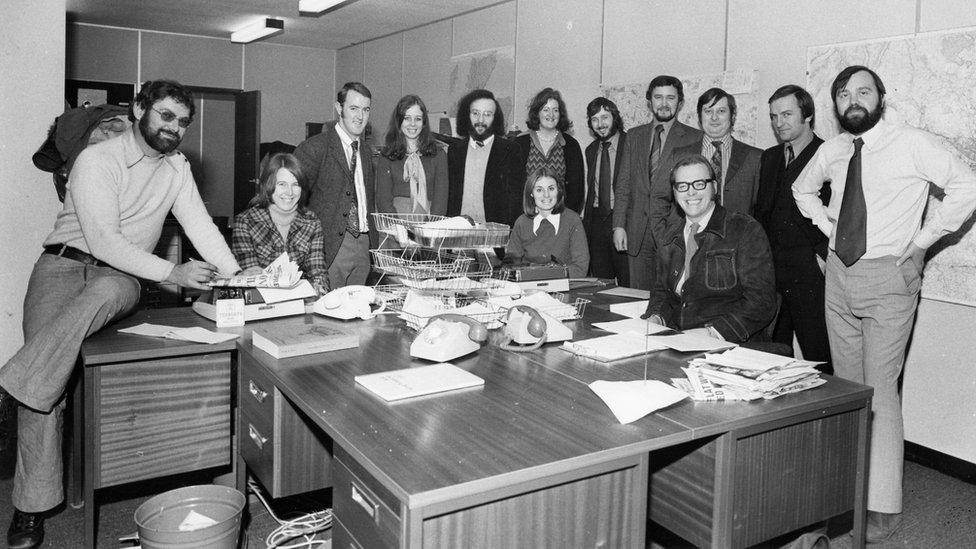Radio Clyde: Marking 50 years of Glasgow voices on the radio
- Published

Tony Currie, Maggie Cockburn and Dave Marshall were the original daytime team at Radio Clyde
Fifty years ago this weekend, history was made in a concrete block in Glasgow.
Radio Clyde was the first official commercial radio station in Scotland and the third in Britain.
Its studios were in the city's Anderston Centre - a controversial 1970s landmark which has since been redeveloped.
But the pioneers of local radio in Scotland had an instant success on their hands and some of their legacy survives.
"It was fairly frantic," remembers broadcaster Tony Currie, who was the first person on air when the station opened at exactly 22:30 on Hogmanay 1973.
"The team started to arrive from about October so by the time we got to the run-up to opening we all knew each other pretty well," he said.
Tony had about two weeks' notice that he would have the honour of opening the station and was given a surprising amount of freedom over how to mark the occasion.
"Nobody told me what to say or what the first record had to be," he said. "Basically, I was told that I go on the air at 22:30 and finish at 02:00."
The first record Tony played was the Song of the Clyde, sung by Kenneth McKellar, which Tony said was appropriate for three reasons.
"Firstly it was about the Clyde, secondly Kenneth McKellar was a director of the company, and a guest in the studio later, and thirdly I'd used the song in my demo tape," he said.
The first advert broadcast on the station was part of a recruitment campaign for the City of Glasgow Police.

The first employees: Tom Steele (news editor), Alex Dickson (head of news), Jimmy Gordon (managing director), Andy Park (head of entertainment) and Sheila Duffy (journalist and presenter)
Radio Clyde opened in the middle of a global economic crisis but was an immediate success - soon capturing more listeners in its area than all the BBC's stations put together - and making money.
In fact, the shortages and strikes that dogged the UK that winter actually helped as television had to close down by 22:30 to save electricity.
But Radio Clyde was not just Scotland's first local station - it was the only radio station at the time which was entirely Scottish in character.
BBC Radio Scotland did not exist. Instead BBC Scotland "opted out" of Radio 4 for individual programmes.
"All of a sudden you could hear Glasgow voices on the radio," Tony said.
"The power restrictions meant those accustomed to watching TV when they went to their beds put on the radio instead and became accustomed to tuning in.
"It was a perfect storm. All the things you would want to come together at the right time came together at the right time."
Tony also believes the political situation in Scotland in the 1970s helped Clyde on its way. Scottish politics was dominated by debate over the creation of a Scottish Assembly, while the two general elections of 1974 were breakthroughs for the SNP.
It might seem strange today to say that politics may have helped a local radio station. But Radio Clyde in its early days had a very varied character, quite different to the dedicated pop station that is Clyde 1 today.

Elton John hosted a four-hour live radio show on Clyde in 1975, produced by Tony Currie - pictured here with Sandy Jardine and Tom Ferrie
Music and DJs were only part of the mix as only eight hours' worth of records - some of it chart music, some aimed at different tastes - could be played every day.
"The rest of the time was filled with everything from Sheila Duffy's recipes to Paul Young's fishing tips," Tony said.
"There was a 15-minute programme each day on the history of Glasgow. There was drama. There was education, consumer advice, star interviews, politics."
Live and specialist music were also part of the mix.
And the station did indeed have a political programme, hosted at one time by future First Minister Donald Dewar, and at another by George Reid who was later the presiding officer of the Scottish Parliament.
Many of the station's broadcasters went on to wider success in the broadcasting world - not least sports presenter Dougie Donnelly, Ross King who provides the showbiz updates from Los Angeles on Lorraine Kelly's ITV show and Paul Coia who was one of the most familiar faces on daytime TV in the 1980s and 1990s.
Perhaps the most-loved local star DJ was Tiger Tim Stevens who spent 35 years with Clyde and became a legend in the west of Scotland. At one point he was so popular he had a recording contract and supported global pop star David Cassidy at Shawfield Stadium in Glasgow.

The Clyde News Team pictured in the newsroom during the opening week
Clyde had one of the largest newsrooms in local radio and several distinguished broadcast journalists spent time there. The list includes former BBC Reporting Scotland presenter Jackie Bird, network BBC News presenter Ben Brown and the late Bill Turnbull of BBC Breakfast.
Tony Currie was also a well-known face on STV in the 1970s and 1980s. He later worked in management and was a continuity announcer for BBC Scotland until five years ago.
As the 1970s and 1980s went on, local radio licences were awarded in many other parts of Scotland - Radio Forth in Edinburgh, Radio Tay in Dundee, Northsound in Aberdeen, Westsound in Ayrshire and Moray Firth Radio in Inverness all tried to follow Clyde's success in their own way.
But in the 1990s things changed dramatically.
Commercial monopolies were broken as new local and regional stations were set up to compete against established names. National commercial radio also went on the air. Restrictions on the number of records which could be played had long gone so most stations focused principally on current pop music and personality DJs.
The original chain of Scottish local radio stations gradually merged and are now owned by the German company Bauer Media.
Centre of creativity
The Media Bill going through parliament will make it easier for all commercial stations to share output as long as they still provide local news and information.
But the original Radio Clyde and the rest of the chain of Scottish local stations have left some legacies.
Their FM stations, such as Clyde 1 and Forth 1, still command significant market shares, provide local news and enjoy local loyalties. Football is another survivor from the original mixed output.
Meanwhile, the former medium wave stations now form the Scottish part of the digital service Greatest Hits Network.
Since the 1990s, a whole range of smaller radio stations have also gone on the air - often run by volunteers and dedicated to local communities or specialist interests.
But these are often quite different to the original local stations which provided numerous full-time jobs and got large listening figures.
As the 50th anniversary approaches, many of the pioneers of Radio Clyde will be toasting their memories of the early days and remembering founder Jimmy Gordon who died in 2020.
Tony believes one of Radio Clyde's greatest legacies was that it helped to shift the centre of creativity in broadcasting out of London.
Perhaps this is best put in the words of the company's original application to broadcast: "To a Glaswegian, Glasgow is the centre of the universe and we want to reflect that."